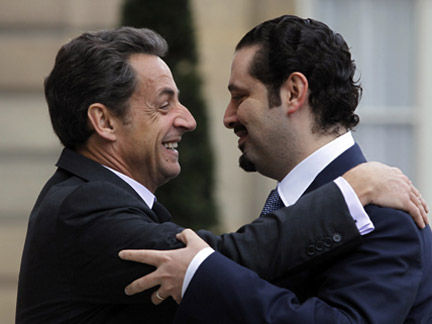Sounds like this fits the bill for the reason for the secret team to bomb the Ethiopian airlines crash, killing the French ambassador's wife and a couple of other french intel assets. Given that we suspect the CIA was involved, it says a lot about just how much in bed the US is with Israel in terms of Israel's Arab blood lust... It seems that, unless something is done to stop them, the Israelis are planning another Lebanon slaughter soon. One year they murder thousands in Palestine, the next year they turn to Lebanon. I wonder if a large scale attack on Lebanon will constitute the "Israeli mistake" that is being predicted.
Lebanon PM seeks France's support in Middle East
http://www.rfi.fr/actuen/articles/121/article_6624.asp
2010-01-22

France's President Nicolas Sarkozy (L) greets Lebanon's Prime Minister Saad Hariri as he arrives at the Elysée Palace in Paris.
Lebanon's Prime Minister Saad Hariri was in Paris on Friday for talks with French President Nicolas Sarkozy, in the first official visit he has made to Europe since taking office in November. Hariri sought French support against an Israeli "intervention" in Lebanon.
Hariri has already met French Prime Minister François Fillon and Foreign Minister Bernard Kouchner during his three-day visit.
The choice of France for Hariri's first visit as Prime Minister reflects the historic relationship between France and Lebanon, said Fillon, adding that Lebanon has France's "full support".
Hariri is seeking to enlist this support in preventing an Israeli "intervention" in Lebanon, as he described it in an interview with Le Monde newspaper.
During a joint press conference with his French counterpart, Hariri stressed "the need to put an end to Israel's daily violations" of UN Security Council Resolution 1701, which called for a ceasefire between Israel and Hizbollah.
"Last week, Israeli planes made 25 flyovers in Lebanese air space in a single day," Hariri told Le Monde.
Fillon agreed on the importance of all parties respecting the resolution, and said France would support Lebanon's efforts to strengthen its national army.
Yet France cannot commit to preventing Israeli military action, Foreign Minister Kouchner insisted.
"Israeli guarantees can only be given by Israel, and we will discuss the issue with them," Kouchner said after meeting Lebanese Foreign Minister Ali Shami, who accompanied Hariri this week.
Lebanon's Defence, Justice, Interior, Social Affairs and Finance ministers made up the rest of the delegation.
Hariri ratified five bilateral co-operation agreements with France during his visit, covering homeland security, legal collaboration, education and research.
Lebanon PM seeks France's support in Middle East
http://www.rfi.fr/actuen/articles/121/article_6624.asp
2010-01-22

France's President Nicolas Sarkozy (L) greets Lebanon's Prime Minister Saad Hariri as he arrives at the Elysée Palace in Paris.
Lebanon's Prime Minister Saad Hariri was in Paris on Friday for talks with French President Nicolas Sarkozy, in the first official visit he has made to Europe since taking office in November. Hariri sought French support against an Israeli "intervention" in Lebanon.
Hariri has already met French Prime Minister François Fillon and Foreign Minister Bernard Kouchner during his three-day visit.
The choice of France for Hariri's first visit as Prime Minister reflects the historic relationship between France and Lebanon, said Fillon, adding that Lebanon has France's "full support".
Hariri is seeking to enlist this support in preventing an Israeli "intervention" in Lebanon, as he described it in an interview with Le Monde newspaper.
During a joint press conference with his French counterpart, Hariri stressed "the need to put an end to Israel's daily violations" of UN Security Council Resolution 1701, which called for a ceasefire between Israel and Hizbollah.
"Last week, Israeli planes made 25 flyovers in Lebanese air space in a single day," Hariri told Le Monde.
Fillon agreed on the importance of all parties respecting the resolution, and said France would support Lebanon's efforts to strengthen its national army.
Yet France cannot commit to preventing Israeli military action, Foreign Minister Kouchner insisted.
"Israeli guarantees can only be given by Israel, and we will discuss the issue with them," Kouchner said after meeting Lebanese Foreign Minister Ali Shami, who accompanied Hariri this week.
Lebanon's Defence, Justice, Interior, Social Affairs and Finance ministers made up the rest of the delegation.
Hariri ratified five bilateral co-operation agreements with France during his visit, covering homeland security, legal collaboration, education and research.
